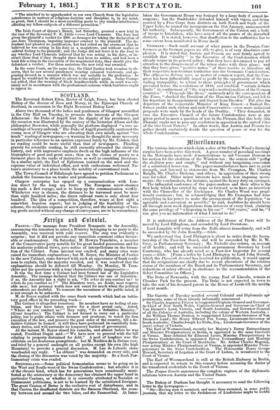furrign
FRANCE.—The message from President Bonaparte to the Assembly, announcing the intention to select a Ministry belonging to no party in the Assembly, was received with cold reserve. The step was evidently a surprise ; but it did not provoke any immediate comment either favour- able or condemnatory. On Saturday, M. Howyn Tranchbre, a member of the Conservative party notable for his great landed possessions and for his moderate political views, gave notice of interpolations on the forma- tion of the Cabinet. Some interest was excited, and many cries were raised for immediate explanations ; but M. Royer, the Minister of Justice in the new Cabinet, came forward with such an appearance of frank readi- ness to explain, that the majority recoiled, and it was resolved that the explanations should be deferred till Monday. On Monday, M. Tran- chere put his questions with a tone-characteristically inaggressive- It was the first time a Cabinet had been formed out of the Legislative Assembly. The message declared that the Cabinet was one of transition : if so, the Assembly has a right to ask, "To what db you conduct us ? to whom do you conduct us ? " The Ministers were, no doubt, most respect- able men ; but personal worth does not count for much when the political antecedents are doubtful. To reassure the uneasiness of the public mind, it ia not enough to be unknown.
M. de Royer replied with the same frank warmth which had an initia- tory good effect in the preceding week— The Cabinet le altogether transitory. Its members have no feeling of am- bition, and they have taken power for a short period only. Asked, "Where do you conduct us ? " they reply, "To a definitive -Ministry." (Great laughter.) The Cabinet is not formed to carry out a particular policy, but to guide affairs with firmness and prudence, to watch the firm execution of the law, and preserve the good order of the country, till a de- finitive Cabinet be formed: it will then have performed its essentially tran- sitory duties and will surrender its temporary burden of government. At the instant M. Royer closed his remarks, and almost before he was seated, President Dupin said—" We have now to proceed with the bill relating to property distrained for debt." A peal of laughter was the criticism on his dexterous promptitude : but M. Mathieu de la DrOme rose, and tried by a general onslaught on all parties except his own (the high Mountain) to provoke a general discussion. M. Leo de Laborde alone vouchsafed any reply. "La elOture " was demanded on every side, and the closing of the discussion was voted by the majority. So a fresh PaP- liamentary crisis was evaded.
Swirzzmarin.—Some political fermentation seems to be going on in the West and South-west of the Swiss Confederation ; but whether it is of the chronic kind, which has for generations been occasionally mani- fested as the aristocracy or the democracy has obtained the upper hand in particular Cantons, or whether it is correctly attributed to Socialist or Communist politicians is not to be learned by the uninitiated foreigner.
The great Canton of Berne is the exclusive seat of disturbance, and in that Canton the disaffected districts are the Bernese Oberland, the coun- try between and around the two lakes, and the Emmenthal. At Inter-
laken the Government House was besieged by a large body if_ armed in- surgents; but the Stadtholder defended himqelf with vigoui, and being assisted by a Free Corps from districts on both North and Scuth of the Upper Lake, he routed the insurgents on the 21st January, andreasserted his authority. Subsequently, the Government of the Canton snit a body of troops to Interlaken, who have seized all the passes of the disturbed districts. It is stated, however, that disaffection to the authoriies has to some extent been manifested in Berne itself. •
GERNIANY.—Such small account of what passes in the Dresden Coal ferences as the German papers arc able to give, is of very Absolutist e,omt plexion. It is stated that Austria and Prussia are now firmly agreed to establish that " duality " in the Executive of the Confederation whioh already reigns in its general policy ; that they have determined to pay nd attention to the disagreement of the minor states with their plans ; and that they have given 'positive notice" of their resolve to introduce a4 their respective non-German territories into the Germanic Confederation, The Allyemeine Zeitung says, as matter of common report, that the Con- gress has been influentially urged to profit by the opportunity of the pre. veiling tranquillity, to return to those principles of government whick prevailed before the revolutions of 1848, and establish "certain definitu limits" in confinement of "the wayward constitutionalism of the German. countries." "Proposals like these," ominously adls the correspondent ot the Times, "shocked the President of the Hanoverian Cabinet, and led to his departure in disappointment and disgust from Dresden." But after the departure of the respectable Minister of King Ernest—a Radical Re: former amidst such violent and rash Conservatives—even more audacious proposals were made by the heads of the Duality. "They demanded, in case the Executive Council of the future Confederation were at any given period to moot a question of war in the Plenum, that this body (the Plenum) ought not to pass any resolution in opposition to the united votes of the two Great Powers." In other words, that Austria and Prussia to gether should exclusively decide the question of peace or war for the whole Confederation.


























 Previous page
Previous page